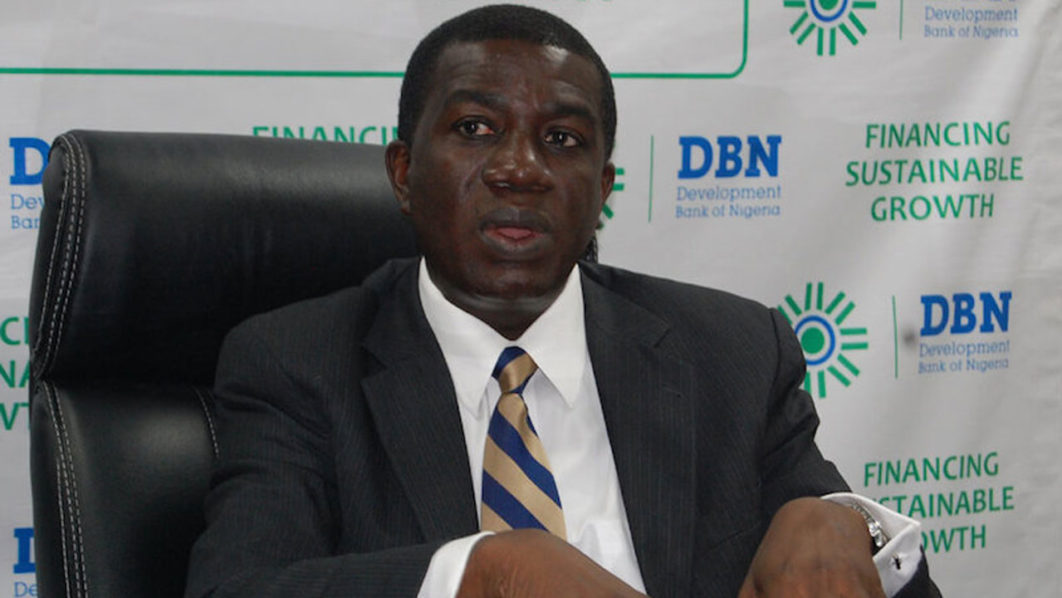
In this interview with COLLINS OLAYINKA, the Managing Director of the Development Bank of Nigeria (DBN), Tony Okpanachi, explained the significance of the bank’s Green Climate Fund (GCF) accreditation and what the bank is doing to mitigate funding gaps facing businesses owned by women and youths.
How much will DBN access from the GCF to address climate-related issues that businesses might require funds for and how will the GCF be administered in Nigeria?
Development Bank of Nigeria has been accredited under the medium category, which means it can access GCF’s funding for projects between $50 and $250 million. DBN has also been accredited for on-lending, blending for loans and project management only.
At this stage, DBN cannot access grant funding, equity and guarantee instruments from GCF.
However, plans are underway to seek an upgrade to include these instruments in the future. GCF funds will be administered on a concessionary rate basis through a structure that will involve close collaboration with the NCCC for project selection, appraisals and alignment with the Nigeria NDC’s. Shortlisted projects will then require detailed funding proposals that will be sent to the GCF for approval. GCF’s resources can only be used for climate mitigation and adaptation projects which must be aligned with Nigeria’s NDC focus areas.
Given the significant role of small business in Nigeria, how has the Development Bank of Nigeria been able to bridge the financing gap of the businesses?
The bank has particularly focused on underserved segments and regions by channelling significant resources to women-owned and youth-owned businesses. DBN also remains unwavering in its support for women-owned MSMEs, recognising the unique challenges they face in accessing financial and business development services.
DBN’s commitment to supporting women entrepreneurs was acknowledged with an honourable mention at the 2022 Global SME Finance Awards. Similarly, DBN has directed efforts towards empowering the youth, who constitute approximately 70 per cent of Nigeria’s population and are the nation’s greatest assets. Innovation remains at the core of DBN’s operations, which is why the Bank has introduced innovative products such as longer-tenured loans and the Finance2Finance product, which facilitates funding for financial institutions that have active MSME portfolios but are unable to receive direct funding from DBN.
The DBN has achieved a ‘AAA’ rating from GCR. What strategies and operational efficiencies have contributed to the exceptional creditworthiness?
DBN’s exceptional creditworthiness can be attributed to several strategies including robust risk management. DBN has implemented comprehensive risk management frameworks that ensure the quality and safety of our loan portfolios. Consistent financial performance, including DBN’s ability to maintain high levels of liquidity and profitability, has been crucial. DBN’s focus on operational efficiencies, including the use of technology and streamlined processes, has enhanced the bank’s service delivery. Collaborations with reputable financial institutions, consultants and development partners have bolstered our credibility and financial strength.
How has the DBN leveraged its partnership with financial intermediaries to expand its reach and impact on MSMEs across Nigeria? What challenges have you encountered and how have you addressed them?
One of the merits of DBN’s wholesale model is the advantage it provides the Bank to leverage the extensive and vast network of its PFIs to reach MSMEs dispersed across the country. Hence, the Bank has strategically partnered with over 69 PFIs across commercial banks, micro-finance banks and other financial institutions as of the end of 2023. Strategies are in place to partner with more PFIs within the financial sectors to disburse loans more effectively. Challenges such as limited financial literacy among MSMEs and the varying capabilities of PFIs have been addressed through targeted training programs and continuous technical assistance support.
One of DBN’s mandates revolves around providing technical assistance to PFIs, enhancing their capability and willingness to lend to MSMEs. Through strategic partnerships with organizations such as Google Nigeria and the Entrepreneurship Development Centre (EDC) of the Lagos Business School, DBN has facilitated capacity-building programs for Nigerian MSMEs to enable these businesses to become financially viable. Additionally, with the introduction of a Learning Management System, DBN has equipped over 5,000 MSMEs as of December 2023 with the necessary knowledge and skills to overcome financing challenges and pursue growth aspirations.
How is DBN addressing the issue of the high cost of borrowing?
We recognise the difficulties businesses face in this challenging economic landscape, and this has indeed increased our resolve as an institution to accelerate and catalyse access to finance for MSMEs. Consequently, the Bank has an interest drawback programme that incentivises the PFIs to on-lend to businesses in key impact segments and sectors of the economy.
Also, there is a close relationship between the cost of capital and risk perception. Hence, reducing both the inherent and perceived risk in the MSME sector will go a long way in reducing the cost of capital. To this end, the bank has a robust capacity-building program developed to enhance the capacity of MSMEs to thrive and become fund-ready thereby unlocking more affordable financing.






